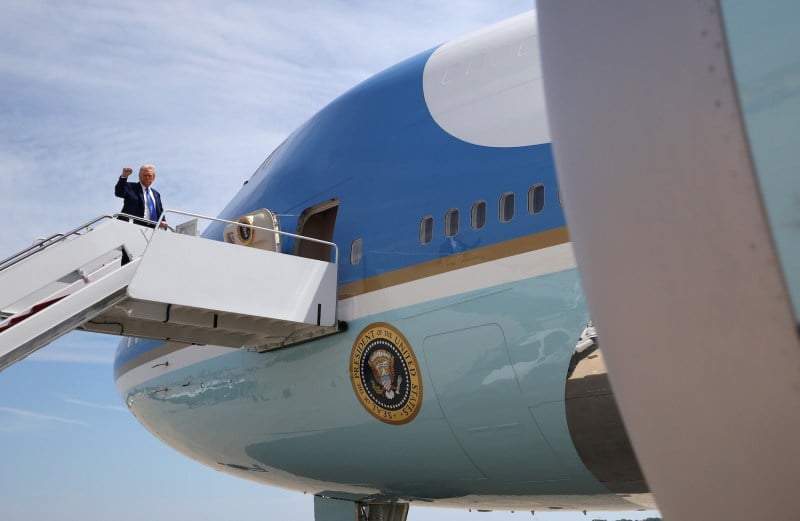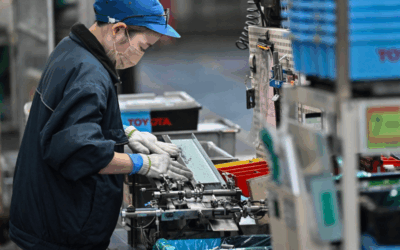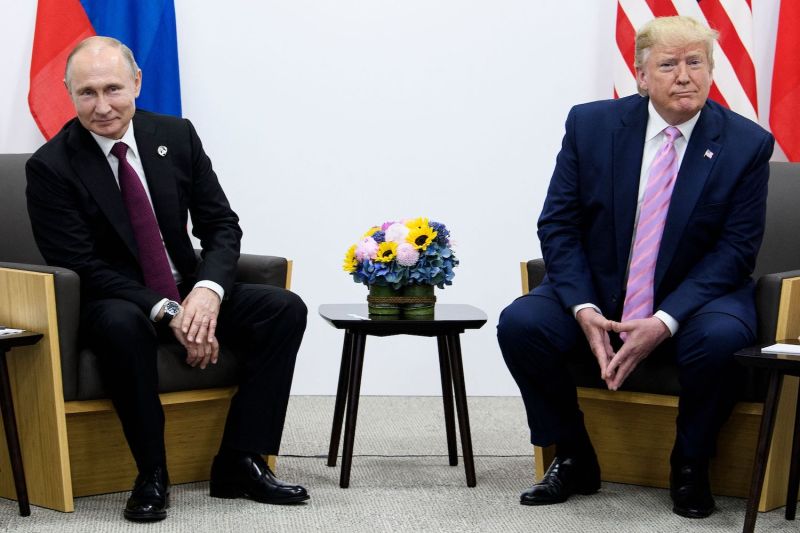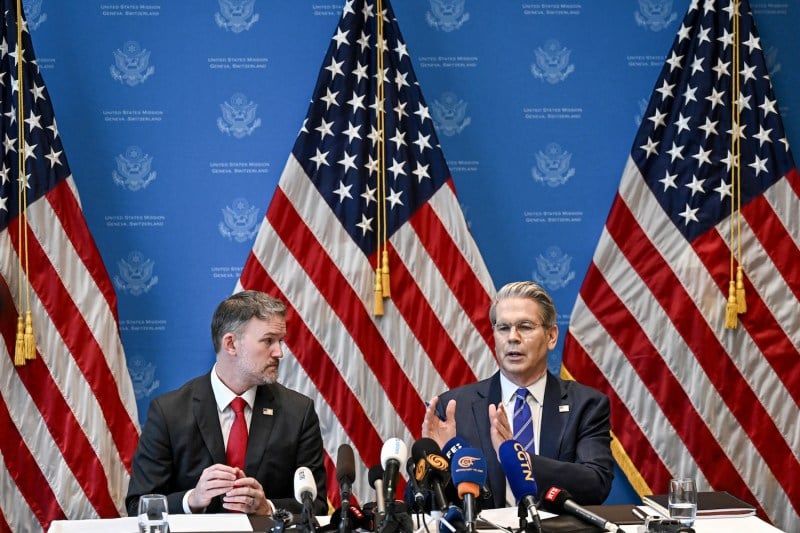Trump Heads to the Gulf With Deals on the Table

Trump Heads to the Gulf With Deals on the Table
The U.S. president’s trip to Saudi Arabia, Qatar, and the UAE has billions of dollars at stake—sometimes with troubling implications.
U.S. President Donald Trump boards Air Force One at Joint Base Andrews in Maryland on May 12, en route to Riyadh. Win McNamee/Getty Images
There are many ways in which U.S. President Donald Trump’s second term in office has diverged from his first. His choice of Saudi Arabia as the destination for his first overseas bilateral visit isn’t one of them.
On Tuesday, Trump will travel to the Saudi capital of Riyadh—just as he did on his first foreign trip in office in 2017—kicking off a three-day regional visit that will also include stops in Qatar and the United Arab Emirates.
There are many ways in which U.S. President Donald Trump’s second term in office has diverged from his first. His choice of Saudi Arabia as the destination for his first overseas bilateral visit isn’t one of them.
On Tuesday, Trump will travel to the Saudi capital of Riyadh—just as he did on his first foreign trip in office in 2017—kicking off a three-day regional visit that will also include stops in Qatar and the United Arab Emirates.
The trip is expected to produce a slew of flashy tech and business investment deals, with the governments of those three countries looking to use their immense wealth to give Trump big economic wins to tout back home in exchange for better access to U.S. technology.
“The main purpose of the trip will be to give the president some wins,” Jon Alterman of the Center for Strategic and International Studies said in a briefing last week. “Trade and investment deals will be announced that will burnish the president’s image as a negotiator. Big numbers will emerge.”
Trump is reportedly seeking at least $1 trillion in investments and deals from the three countries during his visit, with announcements expected to include $100 billion in arms sales to Saudi Arabia and a Qatari purchase of 100 commercial aircraft from U.S. manufacturer Boeing. The UAE got a head start during the visit of its national security advisor, Tahnoon bin Zayed Al Nahyan, to the White House in March, announcing a raft of tech and energy deals with a commitment to invest $1.4 trillion in the United States over the next 10 years.
It remains to be seen how much of that investment will ultimately materialize, but even the promise of it matters to Trump.
“He is a president that measures success in how many billions of dollars he’s able to bring into the U.S. economy—that’s his benchmark,” said Mohammed Soliman, a senior fellow at the Washington-based Middle East Institute who focuses on technology issues. “Trump is a businessman from New York who knows the Gulf very well and sees the Gulf as a region of opportunity for his presidency.”
It also signals the ongoing shift in U.S. geopolitical priorities that Trump has overseen during the first 100 days of his second term, moving Washington away from (and sometimes even antagonizing) its traditional allies in the West. “The Gulf is the new Europe, basically,” Soliman said.
For Riyadh, Doha, and Abu Dhabi, appealing to Trump’s dealmaker instincts is a pathway to accessing U.S. security and military guarantees. Saudi Arabia continues to negotiate a civil nuclear agreement with the United States, though several hurdles in reaching a final deal remain, and Qatar is reportedly preparing to purchase $2 billion worth of U.S. MQ-9 Reaper drones.
“The Gulf states understand one thing about this president: If you want to build an American commitment to you, you do it through an economic framework, because that’s what this president values,” Dennis Ross, a former Middle East advisor and negotiator under several presidential administrations, told a Washington Institute for Near East Policy forum last week. “The more they can build his stake in them because of the economic relationship, the more they can count on the U.S. being there for them from a security standpoint.”
But now more than ever, the emphasis from those three governments will be on technology, as they continue their efforts to diversify from their dependence on oil revenues and attempt to become legitimate players in the global development of artificial intelligence.
To do that, the Gulf states need access to advanced U.S. semiconductor chips, which the Biden administration was reluctant to grant them because of their ties to China and the risk of U.S. technology falling into Chinese hands. One particular sticking point has been the AI diffusion rule put forward by the Biden administration shortly before Trump took office, which imposed strict licensing requirements to buy U.S. chips on all but 18 countries. The UAE in particular has been lobbying against the rule, and it was a key pillar of Tahnoon bin Zayed’s March visit to Washington.
The Gulf states will “want to invest in high-value assets—AI, chips, data centers, low-orbit space capabilities, electric vehicle batteries—all the things they actually care about,” Soliman said. “At the same time, they’ll want to come up with a framework around investment and export controls.”
They may have gotten a big win on that front even before Trump is wheels-up for Riyadh, with the Trump administration planning to scrap the diffusion rule’s licensing requirements before they take effect next week in favor of country-specific deals on chip access.
However, several deals that have been floated in the lead-up to the trip have alarmed many in Washington because of their blurring of the lines between Trump’s presidential powers and his personal profits.
Qatar is preparing to gift Trump a luxurious $400 million Boeing 747 jumbo jet known as the “palace in the sky,” with a stipulation that he will use it as Air Force One for the remainder of his term before transferring it to his presidential library foundation. Trump said in a post on Truth Social that the gift was a “very public and transparent transaction,” but Democratic lawmakers are sounding the alarm on what they say essentially amounts to foreign bribery.
“Any president who accepts this kind of gift, valued at $400 million, from a foreign government creates a clear conflict of interest, raises serious national security questions, invites foreign influence, and undermines public trust in our government,” Sens. Brian Schatz, Cory Booker, Chris Murphy, and Chris Coons said in a statement on Monday. “No one—not even the president—is above the law.”
Qatar’s media attache in Washington, Ali Al-Ansari, described reports of the gift as “inaccurate” in a statement to Foreign Policy. “The possible transfer of an aircraft for temporary use as Air Force One is currently under consideration between Qatar’s Ministry of Defense and the U.S. Department of Defense, but the matter remains under review by the respective legal departments, and no decision has been made,” he said.
That’s not the only deal that has raised the specter of corruption. This month, the UAE-based investment firm MGX—chaired by Tahnoon bin Zayed—announced that it would invest $2 billion in the cryptocurrency exchange Binance through the Trump family-owned crypto company World Liberty Financial.
World Liberty Financial’s website lists Trump as its “Chief Crypto Advocate,” with its leadership team including the president’s three sons—Donald Jr., Eric, and Barron—as well as Trump envoy Steve Witkoff and his sons, Zach and Alex.
Murphy, in an interview with Foreign Policy, described that deal as “maybe the most corrupt foreign-policy act of our lifetime. … It’s just a mechanism for the UAE to hand cash to Donald Trump and his family.”
The Emirati Embassy in Washington did not respond to a request for comment from Foreign Policy.
Trump’s sons have toured the region inking deals for the business conglomerate they continue to run while Trump is president, including agreements to develop multiple Trump properties across Qatar, Saudi Arabia, and the UAE. The White House, Donald Jr., and Eric all downplayed the conflicts of interest in statements to the New York Times, saying that Trump has no personal involvement in those deals and that some of them were in the works before he was reelected. The White House also noted that “the president’s assets are in a trust managed by his children.”
Donald Jr. is also scheduled to speak at the Qatar Economic Forum soon after the U.S. president’s visit, in a session that was previously titled “Monetizing MAGA: Investing in Trump’s America” but has since been changed simply to “Investing in America.” (The forum did not respond to a request for comment from Foreign Policy asking about the change.)
Trump’s crypto ventures are particularly disconcerting to many in Washington. One of the U.S. president’s engagements the week after he returns from his Gulf trip will be a private dinner with the top 220 investors in his so-called digital memecoin, $TRUMP.
“The crypto coin is a mechanism for millions of dollars to move from foreign entities into Trump’s pockets—so Trump’s always been engaged in levels of corruption, but this is supersized corruption,” Murphy said.
Those deals, combined with the signals likely to be sent from Trump’s upcoming trip, give wealthy foreign countries an easy conduit to effectively buy influence and sway U.S. policy, Murphy added.
“That’s a terrible deal for U.S. citizens if America gets nothing in exchange for a favor being done or a concession being made to a foreign government, and the only American who benefits is Donald Trump—personally and financially.”
FP’s Christina Lu contributed to this report.
This post is part of FP’s ongoing coverage of the Trump administration. Follow along here.
Rishi Iyengar is a reporter at Foreign Policy. X: @Iyengarish
More from Foreign Policy
-

Indian Air Force personnel stand in front of a Rafale fighter jet during a military aviation exhibition at the Yelahanka Air Force Station in Bengaluru. A Tale of Four Fighter Jets
The aircraft India and Pakistan use to strike each other tell a story of key geopolitical shifts.
-

A cardinal in a black robe with red sash with hands folded in front of him walks past a stage and steps. Conclave Sends Message With American Pope
Some cardinals had been agitating for U.S. leadership to counter Trump.
-

An illustration shows red tape lines crossing over and entrapping a semiconductor chip. Is It Too Late to Slow China’s AI Development?
The U.S. has been trying to keep its technological lead through export restrictions, but China is closing the gap.
-

A man watches a news program about Chinese military drills surrounding Taiwan, on a giant screen outside a shopping mall in Beijing on Oct. 14, 2024. The Pentagon Fixates on War Over Taiwan
While U.S. military leaders fret about China, Trump has dismissed the Asia-Pacific.








Join the Conversation
Commenting on this and other recent articles is just one benefit of a Foreign Policy subscription.
Already a subscriber?
.
Subscribe
Subscribe
View Comments
Join the Conversation
Join the conversation on this and other recent Foreign Policy articles when you subscribe now.
Subscribe
Subscribe
Not your account?
View Comments
Join the Conversation
Please follow our comment guidelines, stay on topic, and be civil, courteous, and respectful of others’ beliefs.
Change your username |
Log out
Change your username:
CANCEL
Confirm your username to get started.
The default username below has been generated using the first name and last initial on your FP subscriber account. Usernames may be updated at any time and must not contain inappropriate or offensive language.